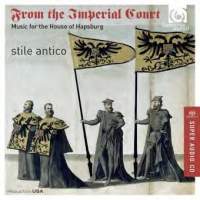Texte paru dans: / Appeared in:

Early Music Today (12/2014- 02/2015)
Harmonia Mundi
HMU807595

Code-barres / Barcode : 0093046759568
(Classicalacarte ID465)
The Habsburgs are hot property this year: the dynasty featured prominently at two of Europe's leading early music festivals (Utrecht and York) and there have been a clutch of new books on the family's fortunes during the 16th and 17th centuries. At its greatest extent, the Habsburg empire ruled over vast swathes of western Europe (as well as Most of South America), and the mix of peoples and cultures that existed in Habsburg
Europe is reflected in the latest recording by Stile Antico, in which they bring together works from the Spanish, Flemish, German and English schools of polyphony.
It's a
welcome return for Stile Antico to this continental repertoire ‑ the
crystalline, shimmering beauty that is their hallmark is tempered somewhat
in much of the music because of the preponderance of lower parts and also
owing to the occasional downwards transposition where it suits the music,
but the results are no less spectacular. Lugubriousness and mourning draw
the best from the ensemble on this recording: Senfl’s lament for the death
of Emperor Maximilian I Quis dabit oculis nostris, de la Rues
Absalon fili mi, Alonso Lobo's Versa est in luctum ‑ if
this is the music of melancholy, who needs to be happy? But the group
bookends the disc with delightful performances of two decidedly festive
works: Morales's Jubilate Deo was written to celebrate a peace treaty
between Spain and France, while Isaac's monumental Virgo prudentissima
(a paean of praise to Maximilian I) is 13 minutes of the finest I've
ever heard Stile Antico sing.
Fermer la fenêtre/Close window
Cliquez l'un ou l'autre
bouton pour découvrir bien d'autres critiques de CD
Click either button for many other reviews


